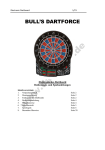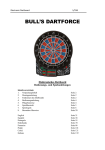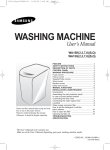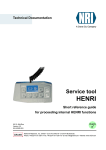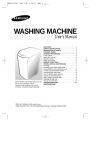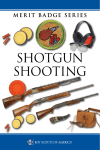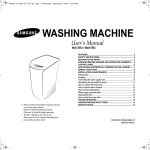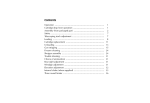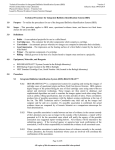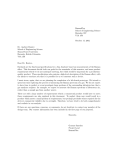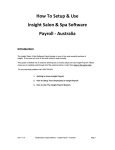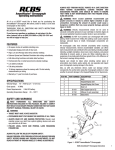Download workbook - The Stockdale Gun Club
Transcript
Trapshooting Overview Trapshooting is a specific form of clay target shooting. Trapshooting is a game of movement, action and split-second timing. It requires the accuracy and skill to repeatedly aim, fire and break the 4 1/4 inch disc which are hurled through the air at a speed of 41 mph, simulating the flight path of a bird fleeing a hunter. Trapshooting's continual growth and expanding popularity is due to the fact that people of all ages, incomes and abilities can compete. Nine year old boys shoot alongside 90 year old men. Many 70-year olds have been in the sport 55 years and some began just two years ago. Trapshooting's participants include millionaires and hourly wage earners, inventors and businessmen, former sports figures in other fields, professional men, farmers, truck drivers, musicians, actors, students and housewives. The shooter is required to shoot at a target after he calls "pull." It does not matter in scoring if the shooter hits only a small piece of the target or whether he shatters the target. The target is considered a "dead" or "lost" bird. If the target is hit it is "dead." It is the shooters responsibility to check his own score. Registered trapshooting is competition that is regulated by the Amateur Trapshooting Association. Gun clubs hold shoots in accordance with ATA rules, but they must apply and register for each shoot. All participants of these shoots must be ATA members. The shooters scores are recorded in the ATA office where all records are kept and yearly averages computed. The records are used for handicapping and classifying shooters. In registered trapshooting, the rules specify that targets must be thrown no less than 48 yards no more than 52 yards and should be between 8 and 12 feet high and 10 yards from the trap. Shooters stand a minimum of 16 yards from the trap houses. Tournament Employees: Please bring along the proper clothing for the weather. Bring rain gear. Cushions for the score chairs. Bring along a cooler and whatever lunch and snacks you would like to eat. It would be very helpful if you read a copy of the official ATA rules and learn the scoring rules. Scoring Instructions The Stockdale Gun Club Page 1 of 22 Trapshoot score keepers Turn the ON/OFF button to ON to start the voice release system. If the system is working properly, and not in the sleep mode, the red light should come on and be ready to throw targets. The voice release system shuts down after 2 minutes of inactivity. To reactivate the voice release system turn the switch OFF and then ON again. Scoring Instructions The Stockdale Gun Club Page 2 of 22 A red light means the voice release is listening and will throw targets. Manual throw button. When the lead off person wants to “see” a target, press the red button at the beginning of the sub-event. Scoring Instructions The Stockdale Gun Club Page 3 of 22 It is recommended to have the control button close at hand or clipped to the scoring clip board. The voice release system needs to be activated to begin the event. DO NOT LET THE VOICE RELEASE CONTROL GET OUT OF REACH WHILE AN EVENT IS BEING SHOT. DO NOT LET THE VOICE RELEASE CONTROL LAY ON THE GROUND. The voice release system must be turned ON and often times, cycled at the beginning of an event to become active from the sleep mode. The voice release system needs to switched OFF before announcing the change or move and remain off while reading the score during the change. When the lead off shooter begins to should his gun after all the contestants have changed position, then switch the ON/OFF switch back to the ON position. Repeat this until the entire sub-event is complete. Turn the switch to the OFF after the last contestant has shot and before you announce either dead and out or lost and out when the last shot is fired. Then proceed to read off the final scores shot on the contestant last post. Scoring Instructions The Stockdale Gun Club Page 4 of 22 The squad sheets must be scored in order. The sheet is marked 1st trap & second trap on one side, the 3rd trap and 4th trap on the back side. Please write in your name and date on the score sheet. There are scoring “F” rule reminders written on the left board of the score sheet as a reminder. Also is an illustration of the official scoring examples. Scoring Instructions The Stockdale Gun Club Page 5 of 22 Trapshoot Employee Loaders Machine Operation Always walk up to the traphouse from the East side to turn off the machine. The above photo reflects the trap machine on off switch. Put up the metal stop sign when going in or of the traphouse. After raising the stop sign wait for the shooters to unload, be for exiting the traphouse. Usually count to 15 before coming out. Keep your traphouse clean. Keep the traprange clean. Pick up all the litter you find. Sell your empty shells to the shooters. Loaders fill the trap machine magazine to one bird above the metal magazine. It is easiest to load the machine on the go while shooters are shooting. Keep adding targets as the magazine spins. When full and waiting for the shooting squad to complete their event, there is time to clean up the trap house, manage the empty boxes and remove the box tops from the next four boxes. Scoring Instructions The Stockdale Gun Club Page 6 of 22 The above photo reflects a trap machine with targets loaded to the proper height. Loaders, stack your empty boxes inside empty boxes. The above photo reflects the proper handling of the empty target boxes. Mate the boxes together EXACTLY AS SHOWN for easy handling. Use empty box as a trash container. Keep the inside of house clean! CLEAN YOUR HOUSE WHILE WAITING FOR THE SQUAD TO STOP SHOOTING IF LOADING ON THE GO. USE THE DUST BROOM AND DUST PAN. PUT CRAP INTO A CLAYBIRD BOX. Stay at your range. Do not stand, sit, or waist time at the traphouse. Get back to safety. TAKE YOUR TIME TO BE SAFE. Scoring Instructions The Stockdale Gun Club Page 7 of 22 Do not load crappy damaged broken targets into the machine. Please load the voice release wagons exactly as show in the picture. Cords wound onto hooks using full arms length winds. Voice releases positions so the cords hand to the inside of the wagons. The manual on off pull buttons laying along side of the wagon sides at the base of the voice release bases. Scoring Instructions The Stockdale Gun Club Page 8 of 22 Do not relief someone else while on your break. Stay at your assigned range. Do not switch places with other employees unless told to do so. Make sure you are scoring on your squad sheets in the correct order. Make sure shooters have complete names on the beginning traps. Date all sheets. Note what event it is on the sheet. Mark it 16’s, Handicap, or Doubles. Park your cars etc. south of the playground. Ending Pullers/Scorer at the ending traps; sit on the completed squad sheets till someone picks them up. Do not give the sheets to the shooters. Check to make sure your range is complete. Look for a pencil, ramrod, clipboard, bench, score chair, trash can, stop shooting sign, and make sure your range is always clean. Before becoming a Puller/Scorer you must know the official scoring rules. Rule books on trapshooting are available. Ear plugs are always available. YOU MUST BE WEARING EAR PLUGS AND EYE PROTECTION! Do not wind the release cords around your elbow. Use full arms length coils so it will hang on the hooks of the voice release mic stand. Make sure your name is on the “Who is Where” clip board with the orange flag to be paid. Turn off the voice release when the shooters are not shooting. Turn off the voice release when you yell “change” and are reading the scores off. Turn off the voice release when you shout “OUT” when the last shot is made. Scoring Instructions The Stockdale Gun Club Page 9 of 22 Yell out the losses, changes, scores, and tip your score board up a little for the shooter to see the scores on all singles events. Yell out the dead, loss, changes, scores and tip your score board up a little for the shooter to see in all doubles events. Two way radios for line personal All the beginning traps should have Midland Radios. The Midland radios are only used to for calling into the office for information. Do not mess with the settings of the radio. Be sure to bring the radios into the sign up building for recharging each evening. Call in to the office to let them know what squad is going to shoot at your range. Call in to the office to see if the squad is full and directions if you are to shoot. Leave radios switched off all times other than when you are calling in to the office. IF YOU HAVE A PROBLEM, CALL FOR A STOCKDALE GUN CLUB OFFICAL! Names/Assignments STOCKDALE GUN CLUB OFFICIALS: • DALE STOCKDALE • KENNTH BRANDT • KEVIN DOERRING SUPERVISORS Scoring Instructions The Stockdale Gun Club Page 10 of 22 TOURNAMENT OFFICE BRICK HOUSE DALE STOCKDALE / SIGN UP BUILDING 641 648 4458 641 648 4458 is all forwarded to 641 425 5020 CELL FIRST AID • FIRST AID KIT IS IN THE SIGN UP BUILDING or ASK AT BRICK HOUSE. RADIO /CELL PHONE/ IPOD USE AND ETIQUETTE • HOLD TALK TO A MINIMUM • LISTEN TO YOUR RADIO AND HOLD THEM SO THAT YOU CAN HEAR • CALL OUT THE SMALL NUMBER ON THE TRAPHOUSE SO WE KNOW WHERE YOU ARE. • IF YOU NEED TO CALL SOMEONE – CALL THE INTENDED PERSON AND THEN IDENTIFY YOURSELF EX. “BANK E - TRAP 9” • IF YOU NEED A TRAP FIXED OR TOO MANY BROKEN BIRDS, CALL FOR “TRAP MECHANIC” • IF A SHOOTER REQUESTS A CHANGE IN TARGETS, CALL FOR “TRAP SETTER” • IF THERE IS A PROBLEM WITH THE VOICE RELEASE SYSTEM, CALL FOR “CANTERBURY” RULES • KNOW THEM WELL – IF YOU HAVE A QUESTION, CALL THE STOCKDALE GUN CLUB OFFICIALS • DEAD/LOST – THERE IS NO RULE ON THE NUMBER OF SQUAD MEMBERS WHO CALL A DEAD TARGET – MOST SHOOTERS ARE HONEST • YARDAGE PROBLEMS – CALL THE TOURNAMENT OFFICE OR THE OFFICE WILL ALERT YOU – THE SHOOTER’S RECEIPT HAS THE EVENT, SQUAD AND POSITION ON IT MISSED SQUADS/BROKEN GUN • DO NOT ALLOW A SHOOTER TO TAKE THE SCORESHEET FROM LAST TRAP – SQUAD LEADER MAY TAKE THE SHEET FROM THE Scoring Instructions The Stockdale Gun Club Page 11 of 22 FIRST TO THE SECOND, BUT THE SCORER ON THE LAST TRAP KEEPS THE SHEET UNTIL WE PICK THEM UP CALLING TARGETS • IF YOU SUSPECT SHOOTERS ARE CALLING TARGETS FOR EACH OTHER – NOTIFY THE TOURNAMENT OFFICE, CALLING TARGETS IS CHEATING. TIME SHEETS • DAILY WRITE IN PAGE IS IN THE SIGN UP BUILDING. USUALLY THE CLIP BOARD WITH THE TILE FLAG ON IT. NATIONAL ANTHEM AND CANADIAN ANTHEM • EVERYONE IS TO STOP AND STAND SILENTLY FACING THE FLAG DURING THE ANTHEMS • AT THE CONCLUSION OF THE ANTHEMS THERE WILL BE GENERAL ANNOUNCEMENTS MADE AND SHOOTERS WILL BE CALLED TO THEIR BENCHES FOR THE START OF THE FIRST EVENT • DO NOT START SHOOTING UNTIL THE ANNOUNCEMENT IS MADE TO TAKE THE FIRING LINE SUPPLIES • CALL DALE IF YOU NEED ANY ADDITIONAL ITEMS THROUGHOUT THE SHOOTING DAY • CALL DALE FOR EQUIPMENT REPLACEMENT SUCH AS CLIPBOARDS, ETC. • NOTHING FROM THE TRAP FIELDS IS TO BE TAKEN HOME IN THE EVENINGS REMINDERS • EYE AND EAR PROTECTION MUST BE WORN AT ALL TIMES – NO EXCEPTIONS • USE “FAILURE TO FIRE” RULES • WRITE THE WORD “DEAD” OR “LOST” ON SCORE SHEETS WHEN AN ERROR IN SCORING OCCURS • SCORERS DO NOT TO HESTITATE TO STOP THE SHOOT IF THERE IS A PROBLEM Scoring Instructions The Stockdale Gun Club Page 12 of 22 • • • • • CLEAN FIELDS BETWEEN EACH SQUAD REMIND LOADERS TO PUT UP THE FLAG TO ANNOUNCE INTENT OF EXITING TRAPHOUSE LOADERS TO KEEP TRAP CLEAN, BREAK DOWN BOXES, KEEP THEM STACKED LOADERS DO NOT TO STACK TARGETS ABOVE THE TOP OF THE CAROUSEL – STACKING TOO HIGH WILL CAUSE BREAKAGE AND MECHANICAL PROBLEMS AT THE END OF THE DAY ► EMPTY HULLS SHOULD BE PLACED IN A BOX ON TOP OF THE TRAP HOUSE, TRASH CAN OR SELL THEM. ► BOXES SHOULD BE BROKE DOWN AND LEFT INSIDE THE TRAP HOUSE ► CLEAN FIELDS BACK TO THE SIDEWALK ► GENTLY LAY MICS DOWN AS TO NOT HOLD WATER ► RESPECT ANY SHOOTERS ON ADJACENT FIELDS –WHILE CLEANING UP, THIS CAN CAUSE A LOT OF PROBLEMS ► BRING MANUAL RELEASE CORD UP TO THE TRAPHOUSE DOOR AND SHUT IT INSIDE THE TRAPHOUSE TO STAY DRY. BAD WEATHER • SHOOTING IS ONLY STOPPED BY A RADIO OR PUBLIC ANNOUNCEMENT. • NORMALLY THE SHOOT GOES ON EVEN IN BAD WEATHER • GET “WET” SCORE SHEETS FROM THE SIGN UP BUILDING • FOLD UMBRELLA IF SHOOT IS CALLED OFF • GO TO A SAFE, DRY PLACE, IF SHOOT IS CALLED OFF ABUSE • IF ANYONE ON THE LINE IS VERBALLY OR PHYSICALLY ABUSED BY A SHOOTER CALL THE DALE WITH THE SHOOTERS SQUAD AND POSITION NUMBER RELIEF CREW • STARTS WITH “FIRST” TRAP ON AT LEAST THE SECOND SQUAD, THEN “SECOND”, THEN “FIRST”, ETC. • RELIEF CREW WILL GIVE A ONE SQUAD BREAK – DO NOT ALLOW CREWS TO TAKE LONGER BREAKS AS IT WILL CAUSE A HARDSHIP FOR OTHERS Scoring Instructions The Stockdale Gun Club Page 13 of 22 GENERAL • BRING FOOD, GATORADE OR OTHER DRINKS IN ADDITION TO OTHER “ESSENTIALS” THEY MAY NEED AS THERE IS LITTLE TIME TO GET AWAY TO BUY ANYTHING, SAVE YOUR MONEY! • COME PREPARED FOR ALL KINDS OF WEATHER • BRING SUNSCREEN • SHOES AND SHIRT AT ALL TIMES • WATCH LANGUAGE • NEVER ARGUE WITH A SHOOTER – GET A STOCKDALE GUN CLUB OFFICIAL Scoring Instructions In this section, you’ll learn: the scoring rules, marking and calling the score, how and when to properly pull the target cord, scoring procedures Handling the most common scoring problems. Scoring Instructions The Stockdale Gun Club Page 14 of 22 Scoring Rules As each shooter attempts to break a target, record the results on the score sheet, and announce the scoring decision. For the exact language of the scoring rules, refer to pages 28 to 34 in the rulebook. Dead Target A ‘dead’ target is a thrown target that has been shot at and hit. A visible piece is broken off the target. The target is completely reduced to dust. A dusted target is a target from which there is a puff of dust, but no perceptible piece is broken. This is not a ‘dead’ target. Lost Target A ‘lost’ target is a missed target. Following are the basic rules for scoring a target ‘lost.’ A shooter shoots at a target and misses it. Dust comes off the target, but a visible piece is not broken. The shooter voluntarily does not shoot. An illegal target is thrown, but the shooter shoots and misses. Failure to Fire Basically, a failure to fire is when the shooter’s gun malfunctions. A shooter is allowed one (2) failure to fire per 25-target sub-event and two (2) per 50-target sub-event in singles and handicap. There are only two (2) failures to fire per sub-event in doubles. The shooter attempts to shoot the first target of the pair, or when the shooter attempts to shoot the second target of a pair after the first target has been shot at and broken and would have been scored ‘dead.’ When the first target of a pair is fired at and missed and that target would be scored ‘lost,’ there is no allowable failure to fire at the second target. This rule helps to keep shooters from turning down a pair if they miss the first target. A defective gun malfunctions and doubles or machine guns, firing both shotshell at the same time. A soft load is when the shell under performs and part of the wad or shot remains in the barrel. Remains in the barrel and the target is missed. If the wad clears the barrel, it is not a failure to fire and is scored ‘dead’ or ‘lost’ as shot. When the first failure to fire occurs, write a large ‘F1’ where the target is scored. Also write an ‘F1’ where the score is totaled. If another failure to fire occurs in the same subevent in a singles or handicap event, the target is scored ‘lost.’ In doubles, write ‘F2’ for the second failure to fire. In our failure to fire examples, we assume that a whole, legal target appears promptly at the shooter’s call. Scoring Instructions The Stockdale Gun Club Page 15 of 22 Singles Example: A shooter calls for a target and the shell does not fire due to a defective primer. Because this was his first failure to fire, write an ‘F1’ in both places on the score sheet. Throw another target and score it ‘dead’ or ‘lost’ in the same box. Later in the same sub-event, the same shooter calls for a target and is unable to fire because his safety is on. This target is scored ‘lost,’ because it is the second failure to fire in the same subevent. Doubles Example: On the first pair of a sub-event, a shooter shoots at and misses the first target of a pair and cannot fire the second shot, because he forgot to load the second barrel of his gun. Score this as ‘lost-a-pair,’ because the shooter shot at and missed the first target. On his next turn, the same shooter is unable to shoot at the first target of the pair due to a defective shell. This is an allowable failure to fire. Mark the score and inform the shooter of the ruling. Because this is an allowable failure to fire, throw another pair of targets to be scored. This time, the shooter breaks both targets. Score them ‘dead-a-pair’ and mark the score sheet with two slashes (‘//’). On his next turn, the same shooter shoots at and breaks the first target but flinches and does not fire the second shot. This is scored an allowable failure to fire. Inform Scoring Instructions The Stockdale Gun Club Page 16 of 22 the shooter that this is his second allowable failure to fire and all subsequent failures to fire in this sub-event will be scored ‘lost.’ The shooter gets this pair over again, and this time he breaks the first and misses the second. Score them ‘dead-lost.’ From this point on, if this shooter has any more failures to fire, they will be scored ‘lost.’ He has already had the two he is allowed in this sub-event. Here are some helpful hints for failure to fire: Determine whether there has been a failure to fire. Decide if the failure to fire is allowable or not. ♦ In singles and handicap, a shooter is allowed one failure to fire per sub-event. ♦ In doubles, a shooter is allowed two failures to fire per sub-event. If the shooter has an allowable failure to fire, he gets that target, or pair, over again. If the failure to fire is not an allowable one, score it ‘lost.’ It is not necessary to determine why the shooter did not fire, unless it was a slow or fast pull. Inform the shooter that an allowable failure to fire or "lost" target has been scored. No Target There are several reasons why a target may be scored ‘no target,’ but basically it is when there is a problem with the target. A target is thrown broken, regardless of the result of any shot fired. A shooter shoots out of turn. Two shooters shoot at the same target. A target is thrown without any “pull” call, provided the shooter does not fire. If the shooter fires, score the result. In singles, two (2) targets are thrown at the same time, regardless of whether the shooter fires. Scoring Instructions The Stockdale Gun Club Page 17 of 22 In singles, an illegal target is thrown, provided the shooter does not fire. If the shooter fires, score the result. A target is thrown whose color is markedly different from that of the other targets and the shooter does not fire. If the shooter fires, score the results. A shooter does not have his feet behind the yardage line – or firing mark – for his event. In doubles, only one (1) target is thrown. In doubles, more than two (2) targets are thrown. In doubles, two (2) targets are hit with one (1) shot. In doubles, one (1) or both targets are thrown illegal, providing the shooter does not fire. ♦ If the shooter fires at an illegal first target and the second target is legal, he must also fire at the second target. If he fails to do so, the legal second target is ruled ‘lost.’ ♦ After a shooter has fired at either a legal or illegal first target, he is not required to fire at an illegal second target. If he does fire, score the result. There is not a score sheet entry for ‘no target.’ Call “no target” and throw the target again. Marking and Calling the Score As each shooter attempts to break a target, record the results on the score sheet, and announce the scoring decision. Mark a ‘’ (straight line) or ‘/’ (slash) if the shooter breaks the target. Call “dead.” Mark a ‘0’ (zero) if the shooter misses the target. Call “lost.” In doubles, score both targets that are thrown. Score the targets in the order they are shot at, which may not always be left to right. Do not try to guess from a shooter’s gun position which target he is going to shoot first. Call out the result of the pair every time. For example: “Dead-a-pair.” “Lost-a-pair.” “Dead-lost.” “Lost-dead.” Score doubles targets in the order they are shot at: ‘0/’ (zero, slash) or ‘/0’ (slash, zero). All doubles shots are called as pairs: For example: “Dead-lost.” “Lost-dead.” “Dead-a-pair.” “Lost-a-pair.” If you make a mistake in marking the score, you may correct it. Mark out the incorrect score. (‘0’) Mark the correct score. (‘/’) Clarify the change by writing the word ‘dead’ or ‘lost’ in the score box. (‘Dead’) Initial the correction. (‘N.B.’) Scoring Instructions The Stockdale Gun Club Page 18 of 22 Scoring is quick, but once you develop the hand/eye coordination, it is easy. Scoring Procedures The score sheet is set up to score going down. After the fifth, or last, shooter in the squad shoots, go back to the top of the score sheet. After all shooters shoot from their current position, the shooters rotate. For safety, the shooters’ guns must be unloaded and open. Call “Change please.” As they rotate, call the individual scores. After all shooters finish shooting at your trap, total each shooter’s score and write the number of targets broken at the end of each row. It is usually easier to count the number they missed and subtract that number from the total for the sub-event. Make sure the score sheet is visible to the shooters so they can check their scores. Ask the squad leader to sign or initial the score sheet. Singles, Handicap & Doubles You may be scoring singles, handicap and doubles. In singles and handicap, the number of targets each shooter shoots at per trap depends if the sub-event is a 25- or 50-target sub-event. Each shooter shoots at 25 or 50 targets per trap – five (5) or 10 at each position. They travel to two (2) or four (4) traps for a total of 100 targets. If the event calls for 200 single targets, the shooters will shoot the first 100 and come back later to shoot the second 100. In doubles, a shooter shoots 25 pair (5 pair at each position). However, at some clubs, the shooter shoots alternating 15 pair and 10 pair sub-events. Please check with your club before the event begins. Handling Problems Even experienced, dedicated scorers occasionally have problems to solve in scoring. This section covers the most common ones. Problem: You call “lost” and two or more shooters believed it was “dead.” You have already marked the score sheet. Solution: You are never required to, but you may change your judgement. If you do, mark out the incorrectly marked score, mark the correct score, write the corresponding word ‘dead’ or ‘lost,’ and initial the correction. The scorer makes the final decision. Problem: Voice release, releases a target before the shooter calls for it. Solution: The shooter has the right to turn down a fast or uncalled pull. If the shooter refuses the pull, rule ‘no target’ and throw another target. If the shooter shoots at the target and misses it, score the target ‘lost.’ If the shooter shoots and hits it, score the target ‘dead.’ Problem: Voice release fails to release a target when the shooter calls for it or the pull was not fast enough. Scoring Instructions The Stockdale Gun Club Page 19 of 22 Solution: The shooter has the right to turn down the slow pull. If the shooter refuses the pull, rule ‘no target’ and throw another target. Problem: As you call out scores and shooters are rotating, there is a problem with the scores. For example, a shooter does not agree with his score. Solution: As stated previously, you may change the score and initial it. If you don’t recall what happened on the shot in question, call help to settle it. Problem: In spite of your best efforts, you record a score in the wrong place and get the scores mixed up. Solution: Stop the shooting by turning off the voice release and take time to quickly make the corrections. SCORER’S NOTES If you get lost, confused or make a mistake, STOP the shooting and clear it up – NOW! TARGETS (Page 55) Legal Targets-Scored as “DEAD” if shot & hit / Scored as “LOST” if shot & missed Broken Targets-A target thrown broken, even if shot at, is never scored Illegal Targets-Only scored if shot at – if not shot at, ruled as “NO TARGET” *Targets are scored or called as “DEAD,” “LOST” or “NO TARGET” *Make your calls of “LOST” & “NO TARGET” loud enough for the shooters to hear LOST TARGETS (Page 29) No Visible piece broken from it (VII.C.1) Missed shots fired at Illegal Targets (VII.C.3) Soft load when shot cup/wad clears the barrel (VII.C.7) Two shots at the same target in Doubles (VII.C.6) Voluntary withdraw or DQ after shooting at least one shot - all remaining targets “LOST” (VII.C.4) FAILURE TO FIRE (Page 30) -Marked as “F1” or “F2” in box with shot score on score sheet -Ruled as a “NO TARGET” and “do over” for the shooter -Third, or more, FTF in a sub event - scored a “LOST” target(s) Scoring Instructions The Stockdale Gun Club Page 20 of 22 Two allowed per sub-event (VII.D.1) Gun / Ammunition malfunction (soft load when wad does not clear the barrel) (VII.D.3) Shooter error (VII.D.1) Doubles-No shot at first target or first target “DEAD” & second target FTF-“NO TARGET” (VII.D.2) Doubles-If shoot at first target-and miss-no FTF allowed on pair (VII.D.2) NO TARGET (Singles & Handicap) (Page 31) Allowable Failure to Fire (VII.E.1) Target thrown broken (VII.E.2) Legal Target thrown with pieces of another broken target (VII.E.3) Shoot out of turn (VII.E.4) Two shooters at the same target (VII.E.5) Fast / slow pull (VII.E.6) Two targets thrown in Singles or Handicap (VII.E.7) Illegal Targets – if not shot at (VII.E.8) NO TARGET (Doubles) (VII.E.11) (Page 32) Only one target thrown (VII.E.11.a) More than two targets thrown (VII.E.11.b) Either target thrown broken-whether either target is shot at, or not (VII.E.11d) Either target thrown is Illegal (If no shot is fired at first target) (VII.E.11.f) (If shot is fired at first target and missed, score the pair as shot) (VII.E.11.f) *Targets scored which a shooter contests/questions must be contested before shooter leaves the shooting post, or before the shooter leaves the trap. *Squad Leader (the shooter on the first shooting position, to the scorer’s left while facing the traphouse) may be called to help with scoring problems. Squad Leader must confirm scores for the squad and sign or initial the score sheet, before the squad leaves the trap. Scoring Instructions The Stockdale Gun Club Page 21 of 22 • OFFICIAL Scoring Instructions The Stockdale Gun Club Page 22 of 22























